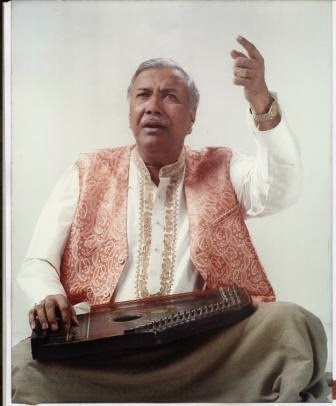USTAD GHULAM MUSTAFA KHAN
THE STREAM OF MUSICAL CONSCIOUSNESS
BY INDU
RAMAN
‘Music begins with silence. When the turbulence
inside us subsides, we will hear the voice of god. That is music.’ Ustad Ghulam
Mustafa Khan Saheb, last in the line of luminaries of yesteryears speaks like a
seer in a spiritual trance.
When Khan Saheb welcomed the new millennium, he could
look back with pride on seventy autumns overflowing with musical joy. Sixty of
those years have been as a performer, a torch –bearer of the famed
Rampur-Sahaswan Gharana of north Indian music. He was only eight years old when
he was pushed onto the stage to fill up for a musician who failed to arrive in
time during a music festival in his native Badayun. His father knew he could
hold the fort for about twenty minutes, but the youngster sang Bhairavi for
over an hour. It was no wonder that the grandson of the legendary Inayat
Hussain Khan and son of Waris Hussain Khan could pull off such a feat. Born into this family where music flowed like
milk and honey, Ustad Ghulam Mustafa Khan Saheb has many singular achievements
unparalleled by any other musician of today.
The Rampur –Sahaswan Gharana is the fountainhead from which a hundred talents have sprung in the last one hundred
years. Baba Allaudin Khan of Maihar was
a student Mohammed Hussain Khan,( brother of Inayat Hussain Khan) who gave this
world Ustad Ali Akbar Khan, Annapurna Devi, and Pt. Ravi Shankar. Inayat Khan’s disciples Chajju Khan and Nazir
Khan established the Bhendi Bazar Gharana. Another student, Bhaiya Ganapat Rao
was the pioneer who introduced the harmonium as accompaniment. V.N. Bhatkande,
yet another student, pioneered the institutionalization of music education.
This phenomenally successful growth of talent through
a single family is reflected in Khansaheb’s career. India’s most famous voices
have honed their skills under the strict tutelage of Ustad Ghulam Mustafa Khan
Saheb. Internationally renowned Hindi film playback artistes, Manna Dey, Asha
Bhonsle, late Geeta Dutt, Kamal Barot, king of Indi-Pop Hariharan, television
heart-throb Sonu Nigam and popstar Anaida are some of those who have benefited
from the intensive training under Khan saheb. Among classical singers are
Lakshmi Nayampalli, brother Aftab Ahmed Khan, Geeta Prem, and his sons, Ghulam
Murtuza and Ghulam Qadir.
‘As a teacher I demand total commitment from my
students. Special attention has to be given to the training of voice. I have
been lucky to have wonderful students who respect me and come up to my
expectations. I have received support, love and loyalty from them.
His dream
is to gather his students around him and have a month long workshop on the
pattern of a Gurukul where everyone will live together and music will be the
only agenda. Through his institution
Sarang he hopes he will be able to create a fund to help youngsters and give financial
aid to deserving musicians. Time and
experience has given his golden voice has a rich timbre which can still
traverse the octaves with ease. ‘I was
trained to adapt my voice and attitude to cover the entire range of musical
forms. My passion for musical knowledge led me to explore the ancient Indian
music treatises like Natya Sastra, Brihat –Deshi and Sarangdev’s Sangeet
Ratnakara. I recreated compositions based on Jati Gayan. Their structure is
intricate and no one had attempted them for 700 years. Over three hours of my rendition have been
recorded for our national archives. ’
Khansaheb’s skill as a composer have been immortalized in several award
winning documentaries and films, besides the bandishes for classical music. His
compositions are pithy, succinct and lyrical. For instance, a ‘chota khyal in
Raga Marvah goes,
Un bin maika chain nahin avey-
jiya bechain din rain sajni-
rovatu rovatu beetatu Rasrang-
tum bin chin din rajni
(My heart is restless without him, oh friend, night
and day my tears flow. Every moment of the day and night is worthless without
you, Oh Rasrang .) Rasrang is the composer's signature.
In a bada khyal in Raga Asaveri he says,
ley ja sandes ley ja piya ke paas
ley ja kaaga un son jaye kahiyo
tumre milan ki aas
baant takat akhiyan pathraayi
rasrang jaaye base ho kavan des.
(Take this message to my beloved, oh raven! Tell
him I yearn for our meeting. My eyes are dry and hard looking out for him. Who
knows where he is?)
Sujat nahi kachu dhyan gyan
Tori Krupa bin gat hai prakat
Tu sabhi mein ek saman
Akal budhi, sakal siddhi , Shakti Bhakti maya Mukti
(Knowledge and meditation will not bring me closer
to you without your grace. Knowledge, discipline, strength, faith, and
salvation are all illusions. Only you are the truth.)
Note: This article was first published in Swagat the Indian Airlines magazine. Ustad Ghulam Mustafa Khan was awarded Padma Bhushan in 2006.

No comments:
Post a Comment